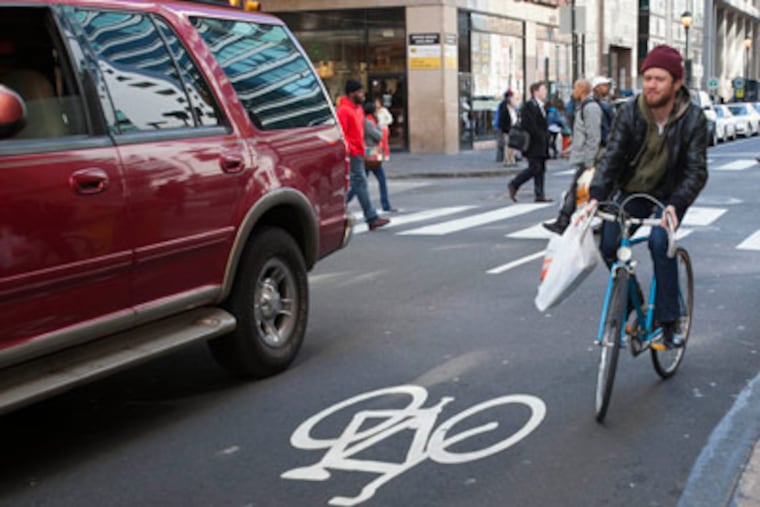A new Pennsylvania law mandates that drivers give cyclists a wider berth
A new law in Pennsylvania requiring cars and trucks to give four feet of clearance when passing a cyclist simply put on the books what good drivers should be doing already, according to the bill's supporters.

A new law in Pennsylvania requiring cars and trucks to give four feet of clearance when passing a cyclist simply put on the books what good drivers should be doing already, according to the bill's supporters.
"All it does is codify what smart drivers and safe drivers already do," said Andrew Stober, spokesman for the mayor's office of transportation in Philadelphia. "There are 20 states that have this law."
The statewide law, which went into effect Monday morning, allows drivers to pass over yellow lane lines to make way for cyclists. Cars turning left must also yield to bikes coming from the opposite direction.
"The four-foot passing law is not about some kind of Big Brother-y attempt to monitor every action on the road, but now a motorist knows they can pass a yellow line to get by a bicyclist," said Nicholas Mirra, communications coordinator for the Bicycle Coalition of Philadelphia.
The onus for road safety is not just on motorists. Bicycles are vehicles by legal standards and have the same responsibility to follow traffic signals, according to AAA MidAtlantic spokeswoman Jenny Robinson.
The new law requires that cyclists "use reasonable efforts" to avoid disrupting the flow of traffic and stay "as close as practicable" to the right-hand curb.
"It really clarifies what we all need to do whether we're in a car or on a bicycle," Robinson said.
Mirra said the law would be particularly important in instances where roads are narrow and the space for bicycles and cars is less defined.
"When you don't have space for a bike lane and there isn't a bike lane there, it's good to have rules of the road to manage these interactions," he said.
Not all bikers are confident in the law's ability to fix safety and collision problems, which include cars parking in bike lanes and bike tires getting caught in damaged storm drains.
"I don't think this changes the reality of biking in the city, which is that you have to have eyes in the back of your head," said Joshua Alsup, a dispatcher for One Hour Messengers, a bicycle messenger service.
Alsup said he was optimistic the issue would have to be dealt with in the near future, as cycling is on the rise. For now, though, he says he's uncertain the new law will do the trick.
"I have pretty much zero confidence in the Police Department's ability to enforce that or desire to enforce that at all," he said.
Sgt. Anthony Manetta, a spokesman for the Pennsylvania State Police, said troopers, who have been made aware of the new law, would begin observing and issuing warnings.
"As with any new law, our first obligation is to educate the public," he said.
Manetta said officers would begin immediately citing drivers for egregious violations of the law - for example, if a car turns in front of a bike, and the accident results in serious injury.
With the weather improving, Manetta said police want the public to be more cautious of cyclists, especially children.
"We're asking people to drive aware," he said.
Pennsylvania Department of Transportation statistics for 2011 count only two cyclist fatalities from motor accidents in Philadelphia, but Alsup said he hears that a biker "bumped" into a car every day.
"This is one of the more dangerous places to bike," he said. Alsup says he has cycled all over the country and in Europe.
Mirra said: "There's a tremendous number of people in Philadelphia who do bike or want to bike but are concerned about the safety of doing so."
Philadelphia has the highest rate of bicycle commuting of the country's 10 largest cities, according to the Bicycle Coalition.
"We think that it's certainly a good law to have on the books, particularly as we see more and more people bicycling in Philadelphia," Stober, of the mayor's office. said.
Mirra said the new law would finally give cyclists legal standing as they increasingly take to the roads.
"There's a lot of cycling in this city and that's not going to go away - it's only going to go up."